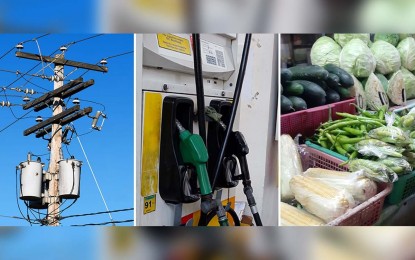[10.25] BSP, 인플레이션 위험에 대한 지속적인 모니터링 약속
컨텐츠 정보
- 17,366 조회
본문
마닐라 - BSP(Bangko Sentral ng Pilipinas)는 인플레이션 위험을 계속 모니터링하고 인플레이션이 계속 상승함에 따라 취약한 부문에 대한 지원을 할 것이라고 말했습니다.
중앙은행은 화요일 성명에서 핵심 식품의 적절한 공급을 보장하기 위한 중앙 정부의 조치를 지지한다고 밝혔다.
농림축산식품부는 “농산물의 전반적인 공급은 낮은 농장 생산성과 높은 생산 비용, 글로벌 공급 차질, 지속되는 동물 질병, 우크라이나-러시아 갈등으로 인한 불확실성, 농산물 무역에 대한 관세 및 비관세 제한으로 인해 제한된다”고 말했다.
BSP는 높은 인플레이션을 해결하려면 높은 가격의 영향으로부터 경제의 취약한 부문을 보호하기 위한 범정부적 접근이 필요하다고 말했습니다.
러시아와 우크라이나 간의 갈등 이후, 국제 유가 상승으로 인한 다양한 국내외 식량 공급 문제와 인플레이션 상승을 해결하기 위해 주요 정책 금리가 인상되었습니다.
정부는 국내 물가상승률에 미치는 영향을 제한하기 위해 돼지고기, 쌀, 설탕 등 다양한 식품의 공급을 늘리고 있다.
BSP는 농업 생산성을 개선하고 주식의 병목 현상을 해결하기 위한 정부의 목표 조치가 인플레이션에 대한 공급측 압력을 완화하는 데 중요하다고 말했습니다.
그는 "중앙은행의 통화 정책 조치는 인플레이션 기대가 더 심화되는 것을 방지하기 위한 재정 정책 및 프로그램과 함께 작동하고 있다"고 덧붙였다. "BSP는 인플레이션 전망에 대한 모든 위험을 모니터링하는 데 경계하고 있습니다." 중기적으로 인플레이션을 목표와 일치하는 경로로 가져오고 결과적으로 경제를 지속 가능한 성장 경로로 이끌기 위해 필요한 모든 통화 정책 조치를 취할 준비가 되어 있습니다.”
국내 물가상승률은 지난해 9월 6.9%까지 치솟았다가 지난달 6.3%까지 하락해 2018년 10월 이후 가장 빠른 수준이다.
올해 1~3분기 평균 물가상승률은 5.1%로 정부 목표인 2~4%를 상회했다.
지난 3월 월간 물가상승률은 정부 목표치인 4%를 웃돌았지만 국제유가 상승과 일부 식료품 공급 제한이 주요인이다.
지난 8월 교통·식량·비주류 지수는 5개월 연속 상승세를 보였다가 둔화했다가 하락했다.
This is the Original Article from PNA NEWS
[10.26] BSP vows continued monitoring of risks on inflation
MANILA - The Bangko Sentral ng Pilipinas (BSP) said it will continue to monitor inflation risks and support for vulnerable sectors as inflation continues to rise.
The central bank said in a statement on Tuesday that it supports the national government's measures to ensure adequate supplies of core foods.
“The Overall supplies of agricultural commodities are restricted by low farm productivity and high production costs, global supply disruptions, persistent animal diseases, uncertainty due to the Ukraine-Russia conflict, tariff and non-tariff restrictions on agricultural trade," it said.
The BSP said solving high inflation requires a pan-government approach to protect vulnerable sectors of the economy from the impact of high prices.
In the aftermath of the conflict between Russia and Ukraine, the main policy rate has been raised to solve various domestic and foreign food supply problems and rising inflation caused in part by rising international oil prices.
The national government is increasing supplies of various foods such as pork, rice, and sugar to limit its impact on domestic inflation rates.
The BSP said the national government's targeted measures to improve agricultural productivity and resolve bottlenecks in staple foods are important to ease supply-side pressure on inflation.
“The Central bank monetary policy measures are working with fiscal policies and programs to prevent inflation expectations from further entrenching,” he added. “BSP is vigilant in monitoring all risks to the inflation outlook.” and is prepared to take all necessary monetary policy action to bring inflation toward a target-consistent path over the medium term, and in turn, steer the economy toward a sustainable growth path.”
The Domestic inflation accelerated to 6.9% last September and fell to 6.3% last month, the fastest rate since October 2018.
The average inflation rate for the first to third quarters of this year was 5.1 percent, exceeding the government's target of 2 to 4 percent.
The monthly price increase rate surpassed the government's target of 4% last March, but this was mainly due to rising international oil prices and limited supply of some food items.
Last August, the Transport and Food and Non-Alcoholic Beverages Index showed a five-month consecutive upward trend before slowing and decelerating.
관련자료
-
이전
-
다음


